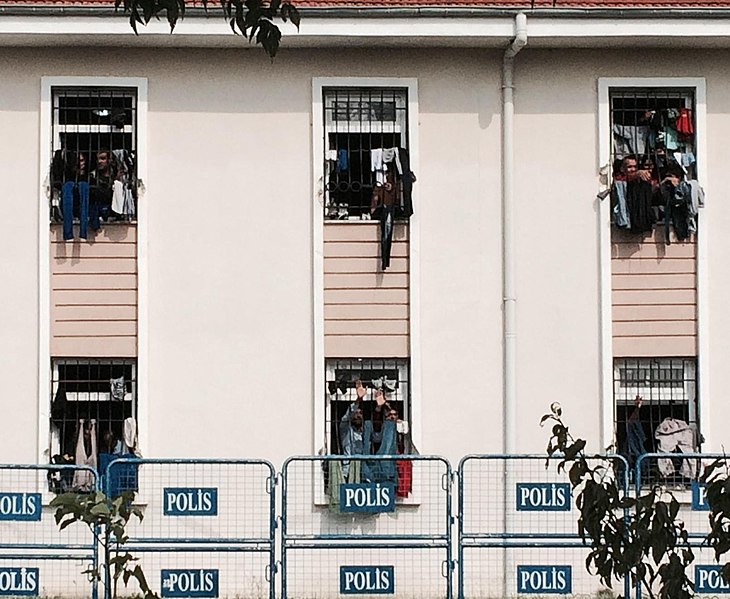Photo: Refugees in a detention centre in Edirne, Greece – Wikimedia Commons
The EU Council has reached an agreement on the last piece of the New Pact on Migration and Asylum, which was presented by the European Commission in 2020 to at last come up with clear-cut rules regarding migration applicable to all member states. The agreement on the so-called Crisis Regulation contains rules that will apply when the European asylum system is confronted with a disproportionate arrival of migrants, for example like in 2015. In such a case, tougher measures are allowed, which immediately poses questions of possible human rights violations. Only Poland and Hungary did not agree on the regulation that was accepted by a majority vote. The new deal has come amid rising tensions in Europe regarding migration and how to deal with it continent-wide, with historic high numbers of people seeking to reach Europe. Current agreements do not seem to act accordingly. The New Pact is planned to be a reform to the current agreement. It should impose more solidarity between the countries, redistributing migrants equally, but the question is whether this time, such a deal will really pay off its intentions.
A ’new’ deal
The New Pact seeks to establish “a common approach to migration and asylum that is based on solidarity, responsibility, and respect for human rights”. In the new deal, solidarity is mandatory but flexible: all countries need to contribute but can decide for themselves in what way. The most logical would be to relocate migrants from first-entry countries to countries further into Europe. But countries can also decide to contribute only in a financial way, basically buying off migrants – €20.000 per migrant to keep them in for example Italy or Greece – dehumanising the matter completely. The possibility of paying in exchange for taking in, will increase responsibility for countries at the border, putting even more pressure on their asylum procedures and controversial detention centres.
Veto is in the air
The upcoming elections in Poland pose a new question on European solidarity regarding migration. Alongside its national elections, Polish voters will encounter a referendum in essence asking them whether they are in favour or against migration. The opposition has expressed concerns about the referendum, saying that the questions are phrased in a leading way. The Polish electoral campaign is dominated by the ruling PiS party calling to protect Poland from illegal migration. “On October 15, we can say no to illegal immigration and to the forced relocation of illegal immigrants,” Polish prime minister Morawiecki said. Poland and Hungary have both announced to veto the complete New Pact. It shows that solidarity within the EU is still hard to find. Interests vary widely between member states. The Commission hopes to implement the new deal before the European elections next year, as they are concerned the continent will take a right turn and the deal will be out of sight completely.
Hope of solidarity
The Common European Asylum System (CEAS) was established in 1999. It guarantees that the EU acts as one when it comes to refugees and asylum. Putting responsibility on the EU as a whole, requires solidarity between the member states. However, asylum flows are not evenly distributed. Countries like Greece, Italy and Spain deal with a disproportionate part of the ‘flow’. Southern European countries have been calling for European-wide action on migration flows but they are not heard by the others. It shows the controversy between signing a deal, promising solidarity within the EU, and the much harsher reality where self-interest seems to come first. The more northern countries seem to think redistribution is voluntary, despite the fact that everyone is part of the CEAS. The New Pact should reform the system but the deal seems not able to count on support from all EU states, again. When certain countries just do not believe in a European asylum system – as Poland and Hungary have made this statement – a new deal will make no difference.
Human rights violations
The ad-hoc crisis management the EU has carried on, has proved to be ineffective. Not only are migration numbers not going down, the human rights situation is not in accordance with EU values. The dire situation in border countries that is being created because other EU countries are not willing to help and accept refugees, stimulates the border countries to try and keep as much migrants out as possible. The pressure on their system forces them to act in inhumane ways, like executing pushbacks, to “protect the European Union”.
It is unlikely that this New Pact changes the human rights situation of migrants for the better. As it will not force numbers down, people will continue to come to Europe, no matter how dangerous. Pushbacks and violations during asylum procedures will prevail as the new deal does not talk about these issues. The Commission hopes the deal would lead to more solidarity and mitigate the asylum problem as a whole, but this line of thought seems ill-founded.
It is wishful thinking expecting that a new deal would change sentiment within the EU completely. Solidarity cannot be guaranteed in a deal if not all countries agree on it. In order to create an effective European asylum system, everyone has to be on board, otherwise tensions between countries could leap to other policy areas as well. Asylum is a fundamental right and an obligation. The EU has the responsibility to stand together and put their shoulders on the wheel, in order to respect human rights and act according to its own core values.
Written by Timon Driessen



